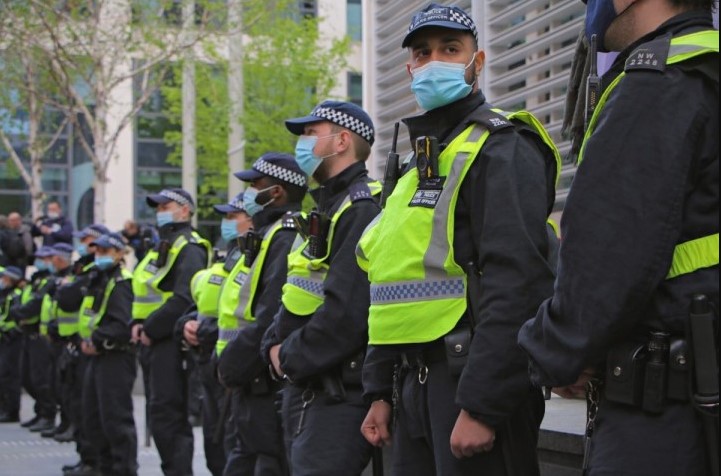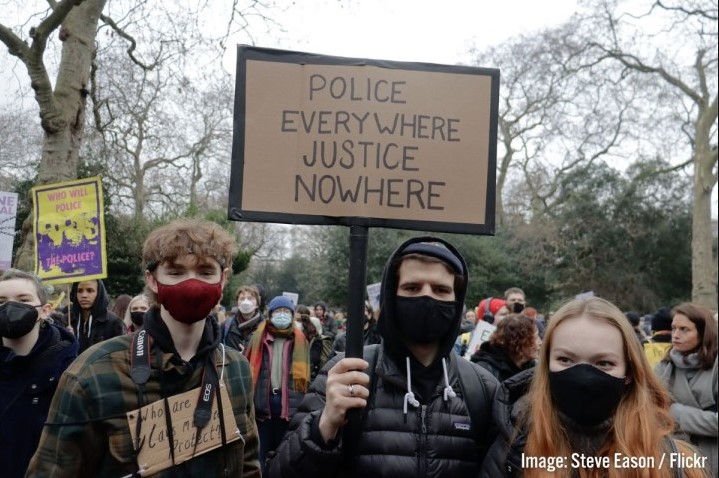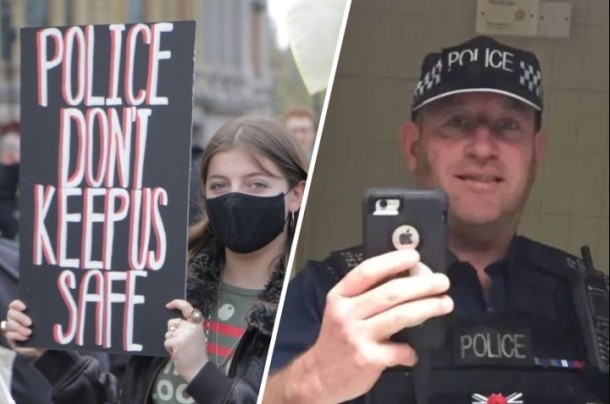The horrific case of serial sex offender and serving officer David Carrick is yet another reminder of how the institution of the police is rotten to the core. Workers and youth must fight to sweep the whole system into the dustbin of history.
David Carrick, an armed officer in the Metropolitan Police, assigned to the Parliamentary and Diplomatic Protection Command, has pleaded guilty to 85 serious sexual offences over two decades.
He is thought to have committed at least 48 rapes against at least 12 women, making him one of the worst known sex offenders in modern history.
Carrick – called “bastard Dave” by his workmates – was consistently promoted and praised as an officer, despite numerous complaints against him.
This harrowing case follows closely in the wake of a torrent of other horrific scandals involving the Met in recent years: the killing of Sarah Everard; the photos and derogatory comments about female homicide victims; the misogyny, discrimination, and sexual harassment at Charing Cross police station; the racist murder of Chris Kaba; and the trauma experienced by Child Q.
This endless string of appalling abuses is fuelling anger and disgust with the police. The conclusion drawn by many – correctly – is that this is a systemic problem, not one of a few isolated individuals. And now Carrick’s offences offer yet another traumatising reminder of why the police cannot be trusted.
This is a major problem for the Tories and the British establishment. They rely on the police to control the working class, which becomes increasingly difficult if the authority of the largest police force in the country is slashed to ribbons.
More than a blind eye
The Carrick case is not a one-off incident. He worked in the same elite police unit as Wayne Couzens, the officer who murdered Sarah Everard. And like Couzens, he used his position as a police officer to facilitate his crimes.
 The establishment is no longer able to portray this systemic problem as simply a case of 'a few bad apples' / Image: fair use
The establishment is no longer able to portray this systemic problem as simply a case of 'a few bad apples' / Image: fair use
Allegations against him were known about before he had even passed his probationary period as a police officer. And yet he was repeatedly promoted by those at the top of the Met, finally reaching the level of elite armed officer.
Even the establishment has given up trying to portray this endemic problem as one of ‘a few bad apples’. After Carrick’s crimes were exposed, Met chief Sir Mark Rowley revealed that approximately 800 serving police officers are being investigated for sexual and domestic abuse. A total of 1,633 cases involving officers over the last 10 years are now under review.
Downing Street has been forced to admit that this and other cases have “shattered” public trust in policing. A former Inspector of the Constabulary has said she fears “there will be more cases” like Carrick’s.
As a final nail in the coffin for public confidence in the police, on ITV’s Good Morning Britain this week, Rowley stated that he couldn’t guarantee that women reporting sex crimes wouldn’t be dealt with by a predator in uniform.
Empty promises
The Tories and police chiefs acknowledge the wave of revulsion and mistrust directed against the police. But all they can offer is empty promises of change.
The murder of Sarah Everard, we were told, would be a watershed moment for the police; a time to look into its culture and practice, and to tackle any problems head on. The Carrick case, they say, should have a similar effect.
Inquiries are promised, and grand statements are made. As the history of the Met Police proves, however, this is all just hot air.
Thirty years ago, after the murder of Stephen Lawrence, we were promised the same thing. This incident, they said, had opened their eyes. The police would learn from this as an institution, and root out racism in the force.
Yet reports consistently highlight how racism persists in the police today. The Child Q revelations are just one example of how nothing has changed since Lawrence’s death.
No solutions
The Tories have said nothing about how they intend to bring about real change at the Met. We are simply told to trust them.
 Even Downing Street has been forced to admit that this and other cases have “shattered” public trust in policing / Image: Steve Eason Flickr
Even Downing Street has been forced to admit that this and other cases have “shattered” public trust in policing / Image: Steve Eason Flickr
The government, we are promised, will overhaul the dismissals process for the police, in order to make sure that it is more rigorous. But this will do precisely nothing – just as every investigation and ‘reform’ has done nothing up until now.
Rowley has also suggested that he would like to increase the proportion of new police recruits who are women from around 30-40% to 50%. Given that he replaced Cresida Dick, on whose watch the Carrick and Couzens cases took place, along with many others, he should know more than anyone that more female police officers does not mean less violence against women.
On the other side of the parliamentary aisle, Labour MP Yvette Cooper has made it clear that she thinks the Tory government has failed women. Clearly, this is true. We must ask, however: what would the Labour Party under Starmer do differently?
In the wake of Sabina Nessa’s murder, Labour Mayor of London Sadiq Khan suggested that we must ‘make misogyny a hate crime’. What difference would this make? The criminality of rape, false imprisonment, and violent assault has done nothing to stop Carrick, Couzens, or any one of the hundreds of other officers currently under investigation.
Starmer’s party has offered no plan for how they would deal with this problem. Instead, the right-wing Labour leadership has consistently gone out of their way to praise and strengthen the police: promising to put more officers on the streets; and ordering MPs to abstain on the infamous ‘spy cops bill’, which provides undercover agents with immunity against crimes committed whilst conducting their operations – including acts of sexual violence.
Regime in crisis
The police cannot change. Misogyny and racism permeate capitalist society at all levels – the product of a system built on exploitation and oppression. The role of the police is to uphold this system. As a result, they reflect all of capitalism’s most vile traits all the more acutely.
Officers are required to police the working class by controlling and monitoring their behaviour, for example. This can attract a certain type of person into the force – one who views oppression as acceptable, or even beneficial.
In carrying out their work, police officers are required to enforce laws against working-class communities, perpetuating the racism and misogyny of the capitalist system. Doing this day-in, day-out inevitably rubs off on their personal attitudes and behaviour.
This creates an insoluble contradiction for the capitalist class. They require a police force to help keep the working class in check, especially in times of sharpened struggle.
This is why the police as an institution was established in the first place. Over time, this has been demonstrated and reaffirmed in one country after another – including most graphically in Britain during the 1980s miners’ strike, or in the more recent blacklisting scandal in the construction industry.
But the police’s ability to hold down the working class requires at least some measure of public consent. And this is undermined by the kind of monsters and abuses that emerge from within the force as a product of the repressive, violent tasks that it must carry out.
The Carrick case, like the Couzens case, is such a headache for the ruling class because it shines a spotlight on this contradiction at the heart of the police. And this problem is only worsened by the fact that it is taking place at the same time as all the other pillars of the regime in Britain – from the monarchy to the Tory Party – are faced with their own permacrises.
This horrific abuse scandal is the latest symptom of a decaying system that cannot be reformed. Its rotten stench is overwhelming. It is time for workers and youth to sweep capitalism and all those institutions that uphold it into the dustbin of history, where they belong.

